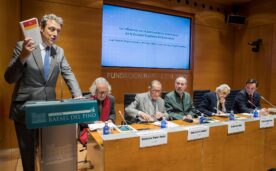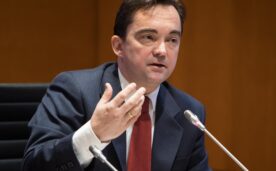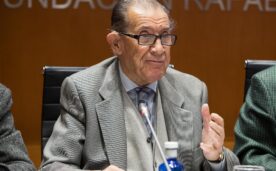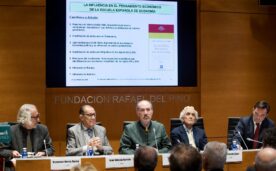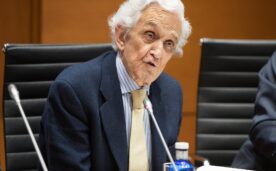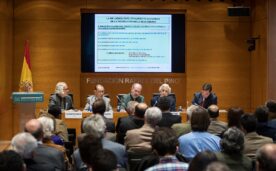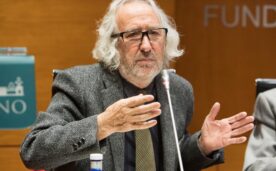On 31 January 2018, the Rafael del Pino Foundation organised the dialogue "La influencia en el pensamiento económico de la Escuela Española de Economía", with the participation of Juan Velarde, Pedro Schwartz, Vitoriano Martín, León Gómez and Ángel Fernández on the occasion of the presentation of the book La Escuela Española de Economía (Unión Editorial, 2017).
The origins of Economics as a science can be found in the Spanish scholastic authors of the 16th and 17th centuries because, as the author explains in this work, as a consequence of the discovery of America in 1492, what can be called a first globalisation took place with great migratory movements of the European population towards the New World and with a great increase in maritime transport and trade in the Atlantic Ocean, This led to the need to study the moral disputes arising from colonisation and market transactions and, consequently, led to the correct identification of most of the economic principles in the works of Spanish scholastic authors. Despite the wars, the scholastic ideas of Spanish authors were transmitted throughout Europe and America thanks to Latin as the common language of the academic world of the time and the use of printing technology that allowed the publication of a large number of books.
Ángel Manuel Fernández Álvarez holds a PhD in Economics and Business Administration, an International Executive MBA and is an engineer. He is a civil servant in the State Corps of Naval Engineers and works in the State Secretariat of Finance of the Ministry of Finance and Public Function. He is a member of the Research Group on the History of Economic Thought of the Department of Economic History and Institutions I of the Complutense University of Madrid (UCM) and of the Research Group on the Thought of the School of Salamanca of the Francisco de Vitoria University, which receives a grant from the Ministry of Economy and Competitiveness for the R&D project with reference number FFI2017-84435-P and title "Society, Politics and Economy: Projections of Spanish Scholasticism in British and Anglo-Saxon Thought".
Juan Velarde Fuertes is considered one of the most important and influential Spanish economists. He stands out in the fields of Spanish and Latin American economics, social security and Spanish thought, as well as showing his wide knowledge in a multitude of subjects. He studied Economics in Madrid, in the first promotion of these studies in Spain. In 1951, he joined the National Labour Inspection Corps, under the Ministry of Labour. In 1956 he obtained his doctorate with an Extraordinary Prize. Years later, he devoted himself to teaching in the faculty where he had studied and in 1960 he became Professor of "Economic Structure and Institutions" at the University of Barcelona. From 1964 onwards, he taught "Applied Economics" at the Complutense University of Madrid, where he holds the title of Emeritus Professor. In addition, during the period 1974-1977 he was Rector of the Universidad Hispanoamericana Santa María de la Rábida. He has been a full member of the Royal Academy of Moral and Political Sciences since 1978 and its president since 16 December 2014, as well as Doctor "Honoris Causa" from the Universities of Alicante, Oviedo, Pontificia de Comillas, Valladolid and Seville. Since 1991, he has been an Advisor to the Court of Auditors and in 1998 Juan Velarde was appointed President of the Forum for Freedom and Quality in Education. ). He is Honorary President of the Diego de Covarrubias Centre. Since 2001, he has been an honorary member of AECA (Spanish Association of Accounting and Business Administration). He currently collaborates with the magazine Época, where he writes a weekly article on political or economic matters.
Pedro Schwartz holds a PhD in Law from the Universidad Complutense de Madrid and obtained his MA and PhD in Political Science from the London School of Economics. He has been president of the Mont Pèlerin Society and founder and member of numerous institutions dedicated to the defence of freedom, including the Centre for European Policy Studies, the Liberales Institut and the Cato Institute. He is a full member of the Royal Academy of Moral and Political Sciences and Rafael del Pino Professor at the Camilo José Cela University.
Victoriano Martin Martin holds a PhD in Economics from the Universidad Complutense de Madrid and is Professor of History of Economic Thought at the Universidad Rey Juan Carlos. He has been director of the Department of Economic History and Institutions and Moral Philosophy at the URJC, as well as director of the Laureano Figuerola Seminar on Economic Thought and Moral Philosophy. He currently teaches at the Permanent Seminar on the History of Economic Thought at the Catholic University of Avila. On 13 November 2013, he took up his place as Full Academician in the section of Political Science and Economics, medal no. 27 of the Royal Academy of Doctors of Spain, with an entrance speech on: Political philosophy and monetary theory in medieval Europe and its reflection in Juan de Mariana. He currently directs the Luis de Molina Study Centre at the Catholic University of Ávila, where he promotes knowledge of the thought of the Spanish scholastics of the 16th century.
León Gómez Rivas holds a PhD in Modern History and Economics from the Complutense University. He works as a Lecturer at the Universidad Europea de Madrid, teaching History and Economic Thought. His research topics deal with the political and economic thought of the second Spanish scholasticism, as analysed in his thesis on The School of Salamanca, Hugo Grotius and the origins of economic liberalism in Great Britain. He is a member of the Mont Pelerin Society, the Diego de Covarrubias Centre and various associations of history and economics teachers. Invited by the Liberty Fund Colloquia, he has travelled several times to the Francisco Marroquín University in Guatemala, with which he collaborates on the Scholastic Site. External evaluator of journals such as Procesos de Mercado, Hispania, Empresa y Humanismo, Revista de Historia Económica and Estudios de Economía Aplicada. He has recently completed a Bachelor's Degree in Theology at the San Dámaso Ecclesiastical University.
